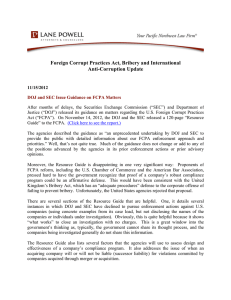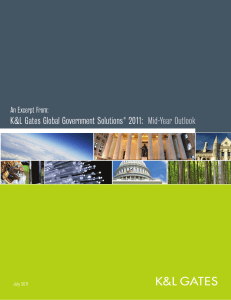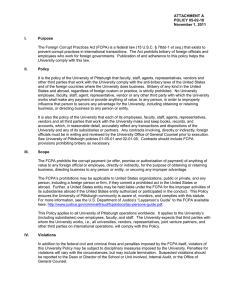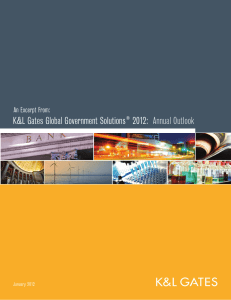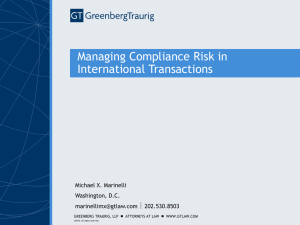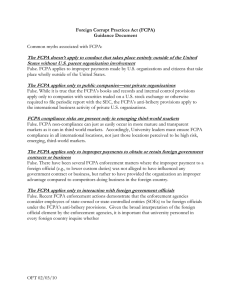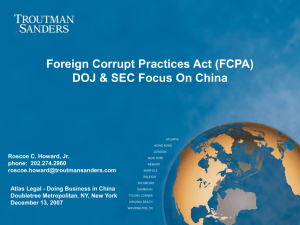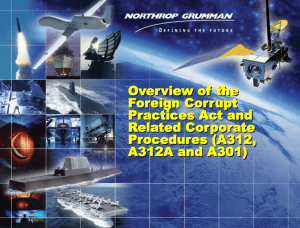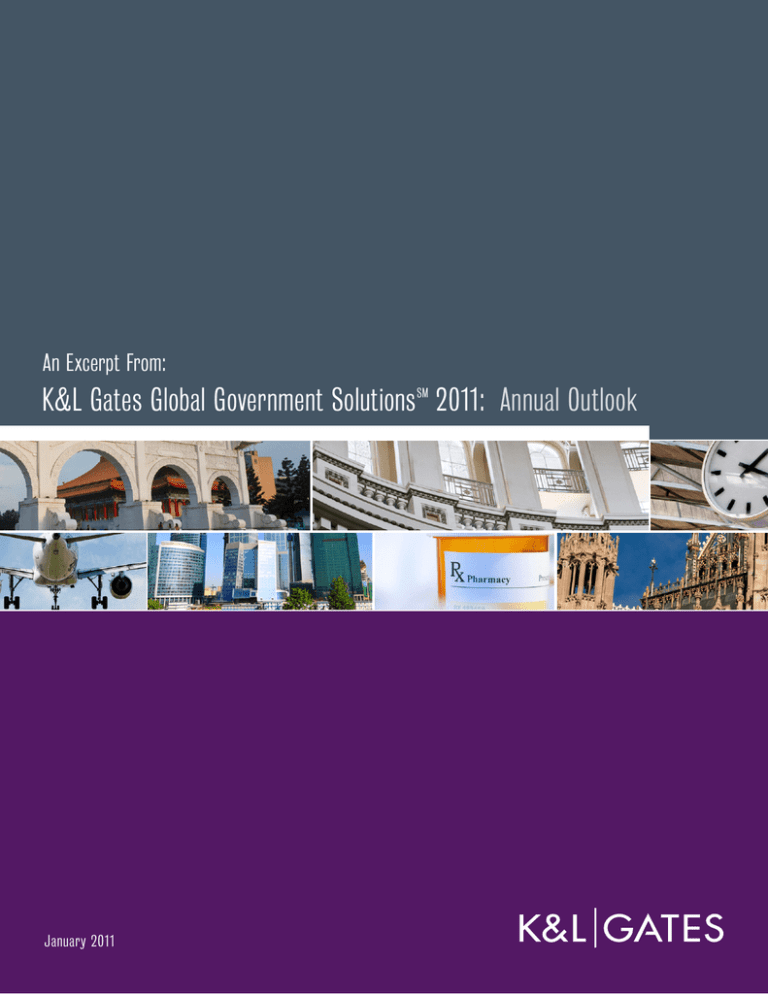
An Excerpt From:
K&L Gates Global Government Solutions SM 2011: Annual Outlook
January 2011
Government Enforcement and Litigation
2011: The Year Ahead–Anticorruption Law
Law enforcement efforts against corruption in international business transactions
gained enormous momentum in 2010. U.S. authorities continued to bring
unprecedented numbers of cases and collect ever-higher fines and penalties for
violations of the Foreign Corrupt Practices Act (“FCPA”), while the United Kingdom
undertook a wholesale revision of its antibribery laws to make them even more
rigorous than the FCPA. For 2011, the risks of running afoul of these laws, and the
consequences of doing so, have never been greater.
United States
U.S. authorities have designated FCPA
violations as a top law enforcement
priority – one that they often mention in
the same breath with the fight against
international terrorism.
More cases, bigger penalties. Viewed
strictly by the numbers, FCPA enforcement
continued to increase exponentially, as it
has over at least the past five years. Both
the Department of Justice (“DOJ”) and the
Securities and Exchange Commission
(“SEC”) have increased the resources
devoted to pursuing FCPA violations,
and public reports indicate that there
are at least 140 open investigations
against companies and individuals.
These agencies brought a total of 74
actions in 2010 – up from an average
of 37 per year in 2007 – 2009,
and approximately 11 per year in
2004 – 2006. By way of comparison,
U.S. authorities had brought only 19
enforcement actions from the enactment of
the statute in 1977 to 2004.
The cases brought in 2010 increasingly
stressed the criminal prosecution of
individuals, with the prospect of individual
fines and significant prison time, and
the imposition of ever-greater fines on
companies. By way of example, in 2010
U.S. authorities levied eight of the 10
largest FCPA penalties ever paid, ranging
from $56 million to $400 million; one
company was dissolved by court order
as a “criminal purpose organization,”
and one individual received an 87-month
prison sentence – the longest prison
sentence ever imposed in an FCPA case.
If anything, however, these numbers
understate the lengths to which U.S.
authorities will go to pursue these matters.
Aggressive enforcement tactics. U.S.
authorities are now employing the kinds of
investigative methods previously reserved
primarily for narcotics and organized
crime cases. Nearly one-third of the FCPA
actions brought in 2010 resulted from a
single sting operation, in which FBI agents
posed as representatives of a foreign
defense minister. It should be expected
that the authorities will also use video
and audio surveillance, wiretaps, paid
undercover informants, undercover
agents, and grants of immunity, to build
FCPA cases.
Expansive jurisdiction and creative
legal theories. U.S. authorities have not
shied away from pursuing cases at the
very edges of their jurisdictional reach.
The FCPA provides for the prosecution of
corrupt payments to foreign officials on
the basis of U.S. citizenship or a relatively
minimal connection to the United States.
In a number of recent cases, however,
the U.S. nexus appears to have been
particularly slim (if not non-existent).
U.S. authorities have been keen to make
an example of those it believes to have
made improper payments, even where
there appears to be little or no basis for
FCPA jurisdiction (or insufficient evidence
to satisfy all of the FCPA’s elements), by
stretching the limits of statutory jurisdiction
or asserting charges of other violations of
law. For example, after British authorities
initially declined to bring bribery charges
against British aerospace manufacturer
BAE plc, U.S. authorities reached a
$400 million criminal settlement with the
company. In light of what appeared to
be a lack of basis for FCPA jurisdiction
(or perhaps an inability to prove an FCPA
case), the U.S. charged the company
with making false statements to various
U.S. agencies about its anticorruption
compliance program and with failing
to disclose to those agencies certain
commissions paid on foreign arms sales,
and in conspiracy to defraud the U.S.
government. Indeed, though the apparent
motivation for the charges was a belief
that bribe payments had been made (and
the plea agreement reads like a bribery
scheme), authorities did not charge any
FCPA violation.
Bounty payments for whistleblowers.
U.S. authorities also anticipate receiving
a significant increase in information about
potential FCPA violations as a result of
the Dodd-Frank whistleblower provisions,
which create substantial monetary
incentives for individuals to report potential
wrongdoing under a variety of laws,
including the FCPA. Those who provide
56
K&L Gates Global Government Solutions SM 2011 Annual Outlook
Government Enforcement and Litigation
independent information leading to a
successful enforcement action in which the
government obtains monetary penalties of
$1 million or more will be paid a “bounty”
ranging from 10 to 30 percent of the
total amount.
There is widespread concern that this
program will undercut the effectiveness
of anticorruption compliance efforts, as
potential violations may be reported to the
authorities in the first instance, rather than
to company officials seeking to identify
and address such activity. Whether or not
this is the case, it seems certain that the
SEC and the DOJ will have an abundance
of tips, and that companies will have even
more at stake in seeking to prevent FCPA
violations in the first place.
United Kingdom
The UK’s new Bribery Act (the “Act”),
which is scheduled to take effect in April
2011, provides for civil and criminal
penalties even greater than those that may
be imposed by U.S. authorities under the
FCPA. Several components of the Act are
particularly significant.
• Broad jurisdiction. The Act provides
for new and very expansive
jurisdiction over companies doing
business in the UK, which can be
prosecuted for bribery undertaken on
their behalf without regard to where
it occurs. It is not precisely clear what
will constitute “doing business” for this
purpose, but the threshold is sure to
be low.
• Strict corporate liability. Companies
subject to the Act will be strictly
liable for bribes given or offered on
their behalf, by any person, acting
anywhere in the world, and without
regard to whether anyone in the
company had knowledge of the
bribe. This means that it will be easier
for UK authorities to prove a violation
of the Act than for U.S. authorities to
establish an FCPA violation.
• Adequate procedures defense.
Unlike the FCPA, the Act provides a
complete defense to strict corporate
liability where a company can
establish that it had “adequate
procedures” to prevent corrupt
payments from occurring. This creates
a compelling reason for companies
to ensure that they have effective
compliance mechanisms to prevent
improper payments.
• Commercial bribery. The Act covers
not only improper payments to foreign
government officials, but private
commercial bribery as well.
K authorities can be expected to
U
make use of their new powers under the
Act, as they brought significantly more
anticorruption cases in 2009 and 2010
than in prior years. That said, there are
major uncertainties, such as the following,
about what this will mean in 2011 and
coming years:
• Jurisdiction over non-UK
companies. How aggressively will
the UK authorities interpret their
authority to pursue allegations of
corrupt payments by companies with
a minimal business presence in the
UK, where the payments have no
other connection to the UK?
• Facilitating payments. Will UK
authorities bring charges against
companies making facilitating
payments? Unlike the FCPA, the
Bribery Act makes no exception for
such payments.
• Gifts and entertainment. Will
UK authorities provide clarity on
permissible business gifts and
entertainment, given that the Act
appears to prohibit them entirely?
Thus far, the authorities have
advised companies to trust in proper
prosecutorial discretion.
• Enforcement resources. Given its
UK government devote significant
resources to the pursuit of foreign
bribery cases, particularly those at
outer reaches of the Act’s authority?
Other OECD Countries
International efforts against corruption date
from the 1997 Convention on Combating
Bribery of Foreign Public Officials in
International Business Transactions,
which was entered into by the member
states of the Organization for Economic
Cooperation and Development (“OECD”).
While all 38 member states had, by
2002, adopted laws similar to the U.S.
FCPA, the enforcement of those laws
varies greatly from country to country.
The United States was the driving force
behind the OECD Anti-Bribery Convention,
with a primary objective being to “level
the playing field” abroad for U.S.
companies subject to the FCPA. That goal
remains a distant one, notwithstanding the
efforts of the United States and the UK. A
2010 report by Transparency International
indicated that only five other OECD
members were actively enforcing those
laws – Denmark, Germany, Italy, Norway,
and Switzerland. The report noted that
there was little or no enforcement activity
by 20 of the 38 OECD member states,
and only moderate levels in the
remaining ones.
Whether in fact the playing field will ever
be leveled will depend on whether these
and other nations have the political will to
prosecute matters involving international
corruption. That seems, at best, unlikely at
a time when the solvency of many national
governments appears to be at risk.
Matt T. Morley (Washington, D.C.)
matt.morley@klgates.com
Brian F. Saulnier (Pittsburgh)
brian.saulnier@klgates.com
Robert V. Hadley (London)
robert.hadley@klgates.com
massive budgetary crisis, which has
already led to social unrest, will the
K&L Gates Global Government Solutions SM 2011 Annual Outlook
57
Anchorage
Los Angeles
San Diego
Austin
Miami
Beijing
Berlin
Moscow
San Francisco
Boston
Newark
Seattle
Charlotte
New York
Shanghai
Chicago
Dallas
Orange County
Singapore
Dubai
Palo Alto
Fort Worth
Paris
Spokane/Coeur d’Alene
Frankfurt
Pittsburgh
Taipei
Tokyo
Harrisburg
Portland
Raleigh
Hong Kong
London
Research Triangle Park
Warsaw Washington, D.C.
K&L Gates includes lawyers practicing out of 36 offices located in North America, Europe, Asia and the Middle
East, and represents numerous GLOBAL 500, FORTUNE 100, and FTSE 100 corporations, in addition to growth
and middle market companies, entrepreneurs, capital market participants and public sector entities. For more
information, visit www.klgates.com.
K&L Gates comprises multiple affiliated entities: a limited liability partnership with the full name K&L Gates LLP qualified in Delaware and maintaining offices
throughout the United States, in Berlin and Frankfurt, Germany, in Beijing (K&L Gates LLP Beijing Representative Office), in Dubai, U.A.E., in Shanghai (K&L Gates
LLP Shanghai Representative Office), in Tokyo, and in Singapore; a limited liability partnership (also named K&L Gates LLP) incorporated in England and
maintaining offices in London and Paris; a Taiwan general partnership (K&L Gates) maintaining an office in Taipei; a Hong Kong general partnership (K&L Gates,
Solicitors) maintaining an office in Hong Kong; a Polish limited partnership (K&L Gates Jamka sp.k.) maintaining an office in Warsaw; and a Delaware limited
liability company (K&L Gates Holdings, LLC) maintaining an office in Moscow. K&L Gates maintains appropriate registrations in the jurisdictions in which its offices
are located. A list of the partners or members in each entity is available for inspection at any K&L Gates office.
This publication is for informational purposes and does not contain or convey legal advice. The information herein should not be used or relied upon in regard to
any particular facts or circumstances without first consulting a lawyer.
©2011 K&L Gates LLP. All Rights Reserved.

